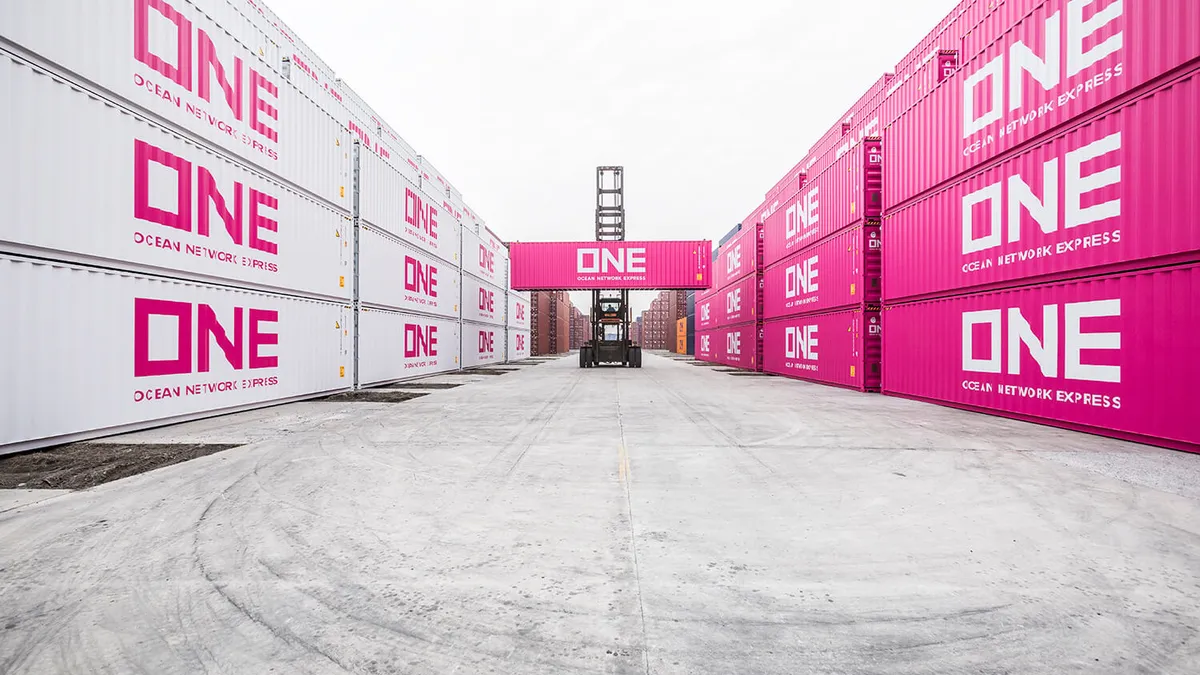Dive Brief:
- Union Pacific (UP) last week said it had been chosen by Ocean Network Express (ONE) to handle all intermodal shipments arriving in the U.S. West Coast ports of as of April 1, 2018.
- Containers arriving on the newly formed carrier's 11 services to Los Angeles, Long Beach, Seattle or Tacoma will be serviced by UP on-dock and near-dock facilities. UP said it was proud to "continue" its relationship with the carriers making up ONE.
- The shipping line — formed from a merger of Japan's top three container carriers in 2016 — is set to launch its first services, worldwide, next week.
Dive Insight:
A triple merger at this scale has never before been seen in the ocean shipping industry, but ONE has so far sailed smoothly toward its launch.
K Line, Mitsui OSK Lines and NYK Line joined the industry's wave of consolidation in November 2016 but took their time to set up shop as a joint entity. It was not until May 2017 the carriers announced their new name and said services would launch April 2018. In the meantime, ONE set up offices in Richmond, Virginia, and began accepting bookings for future sailings in February 2018.
The rosy picture is only compounded by recent news. The official partnership with UP should ensure continuity and help ease fears of shipments getting lost in the fray of terminal operations.
At JOC Events' TPM 2018, ONE CEO Jeremy Nixon said his company was focused on doing container shipping well, rather than expanding into a 3PL-type service. Stability, he said, was the main reason for the consolidation, and the carriers' focus going forward.
Stable. Simple. Stable. Smooth. Stable. Flow. Stable. Major message from Jeremy Nixon of ONE #TPM2018. Looking forward to welcoming ONE to @BigShipReady in @PortVancouver in April!
— Katherine Bamford (@kbpmv) March 6, 2018
But this widespread emphasis on guaranteeing stability and smooth operations belies a perennial problem for the shipping industry — when a new service is launched, the vast number of actors involved raises the risk of something going wrong at the expense of the cargo owner.
In 2017, a number of new alliances were launched, shifting services worldwide. For a brief period last May, shippers watched as ports faced unforeseen congestion, both at the dock and in terminals, due to confusion over inbound cargo. With over a year of preparation time, and numerous partnerships inked, supply chain stakeholders are hoping similar problems do not resurface.
"Everyone affected with this merger — the shipping lines, marine terminals, cargo owners, other Port stakeholders – has been gearing up for it since last year,” said Port of Oakland Maritime Director John Driscoll in a press release. “There may be unforeseen challenges, but we are confident they will be promptly addressed and no operational disruptions in Oakland are expected.”















